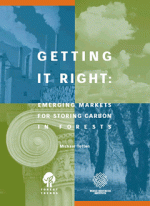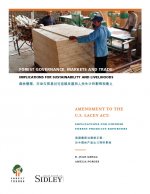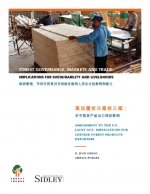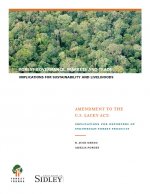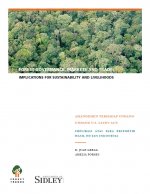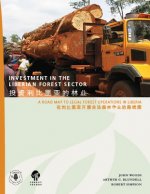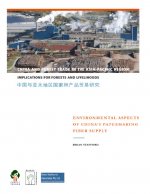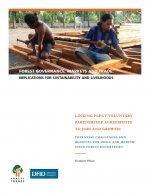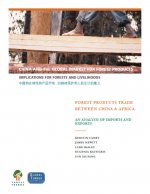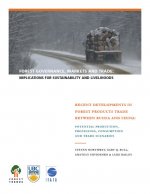Adding Value
Can FLEGT Voluntary Partnership Agreements Lead to Increased Investment and Trade for Partner Countries?
By Dominic ElsonIn May 2003, the European Union published its proposal for a Forest Law Enforcement, Governance and Trade (FLEGT) Action Plan which sets out a range of measures that aim to tackle the global problem of illegal logging and associated trade, including financial and technical support to achieve improved forest governance in developing timber-producing countries. It […]
Getting It Right
Emerging Markets for Storing Carbon in Forests
By Michael Totten - World Resources Institute, Forest TrendsForests offer one of the most cost-effective opportunities for storing or sequestering carbon. This report is directly relevant to companies in any industry – not just forest products. Indeed, there are clear co-benefits to be gained from companies interested in carbon offsets, and forestland managers and conservationists in temperate and tropical settings in need of […]
State of the Voluntary Carbon Markets 2009
Fortifying the Foundation
By Katherine Hamilton, Milo Sjardin, Allison Shapiro, Thomas MarcelloThis report was created to answer fundamental questions about the voluntary carbon markets such as transaction volumes, credit prices, project types, locations, and the motivations of buyers in this market. Over the past several years, these markets have not only become an opportunity for citizen consumer action, but also an alternative source of carbon finance […]
Email Signup
Subscribe to any of Forest Trends’ mailing lists to keep up with the news, publications, and events that interest you.
Having Trouble?
If you experience any technical difficulties on our site, please contact Genevieve Bennett, Communications Manager.
Amendment to the U.S. Lacey Act
Implications for Chinese Forest Products Exporters
By R. Juge Gregg, Amelia Porges - Sidley Austin LLP, Sidley Austin LLP, Forest TrendsA recently passed law gives the U.S. government the power to fine, and even jail, individuals and companies who traffic in illegally harvested wood products. The U.S. government can even use this law, called the Lacey Act, to impose significant penalties on individuals and companies who do not realize that their wood is tainted. This […]
Dependent Documents
Chinese Version: Amendment to the U.S. Lacey Act
Implications for Chinese Forest Products Exporters
By R. Juge Gregg, Amelia Porges - Sidley Austin LLP, Sidley Austin LLP, Forset TrendsAmendment To The U.S. Lacey Act
Implications for Exporters of Indonesian Forest Products
By R. Juge Gregg, Amelia Porges - Sidley Austin LLP, Sidley Austin LLP, Forest TrendsA new law gives the U.S. government the power to fine, and even jail, individuals and companies who traffic in illegally harvested wood products. The U.S. government can even use this law, called the Lacey Act, to impose significant penalties on individuals and companies who do not realize that their wood is tainted. This new […]
Dependent Documents
Bahasa version: Amendment To The U.S. Lacey Act
Implications for Exporters of Indonesian Forest Products
By R. Juge Gregg, Amelia Porges - Sidley Austin LLPInvestment in the Liberian Forest Sector
A Roadmap to Legal Forest Operations in Liberia (English and Chinese)
By John Woods, Arthur G. Blundell, Robert Simpson - Forestry Development Authority of Liberia, UN Security Council Sanctions Committee on Liberia, U.S. Forest Service Office of International Programs, Forest Trends, UK Foreign and Commonwealth OfficeThis briefing document explains why Liberia needed reforms that ensure that logging no longer contributes to conflict in this country and how logging will be conducted under the new law and regulations that govern the management of Liberia’s forests.
Environmental Aspects of China’s Papermaking Fiber Supply
By Brian Stafford - Brian Stafford & Associates Pty Ltd:, Forest TrendsIn recent years, China’s expanding pulp and paper sector has become a major influence on the global forests and forest product markets. Since 1990, China has accounted for over 50 per cent the world’s overall growth in paper and paperboard production. To meet growing domestic demand, the government is promoting a new industry based on […]
Linking FLEGT Voluntary Partnership Agreements to Jobs and Growth
Potential Challenges and Benefits for Small and Medium Sized Forest Enterprises
By Dominic Elson - DFID, Forest TrendsThis brief report discusses the potential impact of the European Commission’s Voluntary Partnership Agreements (VPAs) on the extent to which improved investment and business climates supported by VPA programs can support the small and medium forest enterprise (SMFE) sector. Recognizing the important roles that SMFEs play in rural development and the alleviation of rural poverty, […]
Forest Products Trade Between China & Africa
An Analysis of Imports & Exports
By Kerstin Canby, James Hewitt, Luke Bailey, Eugenia Katsigris, Xiufang Sun - Forest Trends, Forest Trends, Forest Trends, Forest Trends, Global TimberRecent reports of China’s efforts to secure access to natural resources in Africa suggest that timber has already become an important traded commodity between China and the African continent. Many hold a general impression that Africa exports a significant and growing amount of timber to China. However, the true magnitude of the China-Africa forest product […]
Recent Developments in Forest Product Trade between Russia and China
Potential Production, Processing, Consumption and Trade Scenarios
By Steven Northway , Gary Q. Bull, Anatoly Shvidenko, Luke Bailey - University of British Columbia, Forest Trends, University of British Columbia, Faculty of ForestryChina has a very significant role in the global timber market and this has significant ramifications for forests, forest livelihoods and the structure of forest industries around the world. In this report we will focus on possible future trends in the forest products-processing, consumption and trade between China and its main suppliers, with a particular […]

